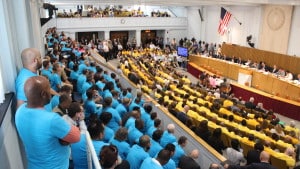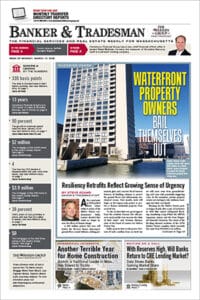The dispute between Boston’s taxi companies and popular ridesharing apps such as Uber and Lyft hit perhaps its most dramatic peak yesterday, as crowds of supporters from both sides fell upon the Massachusetts Statehouse for a hearing by the Joint Committee on Financial Services regarding new regulations for the apps.
With yellow, blue and pink shirts marking their affiliations (taxis, Uber and Lyft, respectively), supporters expressed their views outside the Statehouse, some more vocally than others, as the hearing drew closer.
“Uber is really bad – they have no safety at all,” said Josue Jeko Pierre, a driver for Green Cab in Somerville, one of many unionized Boston-area cab companies present, as the crowd funneled into the Statehouse. “I hope they regulate Uber. If not, they have to kick them out.”
Uber driver Lee Josie, on the other hand, said that his company is “the best way to go” for Boston due to taxis’ lack of tax payments on cash transactions, as opposed to the taxed electronic payment system used by the Uber app.
“Let nobody fool you,” he said. “This is revolution. You can’t stop revolution from happening.”
Lyft driver Ben Atherton-Zeman emphasized the social good that his company does through initiatives against domestic violence, and said that rideshare companies deserve to stay and be treated fairly.
“I hope that our senators, our reps join together with the governor to realize that rideshare is here to stay,” he said. “We have families to support, and I think there’s a way we can get it so that everybody wins – taxis, rideshare drivers and passengers.”
Inside the Gardner Auditorium, the committee discussed proposed legislation.
Senate Bill 559, “An Act Relative to Transportation Network Company Insurance,” seeks to expand the level of insurance required of drivers for transportation network companies (TNCs), making them more comparable to the commercial insurance necessary for taxis – a standard of $1 million worth of coverage for bodily injury, property damage and liability. Legislators noted, however, that unlike taxis, which are used solely for business purposes, TNC cars are also drivers’ personal vehicles – activated and deactivated for business use throughout the day.
Sumbitted by Gov. Charlie Baker, H3351, “An Act Establishing Department of Public Utilities Oversight of Transportation Network Companies,” would place regulation and oversight of TNCs in the hands of the Department of Public Utilities (DPU), who currently controls suitability regulations for bus drivers working for city and state organizations.
The most controversial of the bills, H3702, “An Act Relative to Passenger Safety,” seeks to establish “marketplace fairness” through regulations on employee background checks and pricing standards. The bill calls itself an “emergency law, necessary for the preservation of the public convenience.”
Though Uber has openly embraced other legislation, H3702, and its sponsors Rep. Michael J. Moran of Brighton and Rep. Linda Dorcena Forry of Dorchester, have been the target of biting criticism.
“Instead of regulating companies, H3702 puts burdens directly on drivers that will discourage people from signing up to drive – including fingerprint checks not currently required of taxi and limo drivers and economically burdensome and duplicative insurance coverage,” Uber’s East Coast General Manager Meghan Joyce said during her testimony. “If such a proposal were to become law, it would effectively ban ridesharing services from Massachusetts.”
Moran and Forry, however, were warmly received by the taxi union presence, who gave applause, and even a standing ovation, following some of their more pointed comments.
Other speakers included Boston Police Commissioner William Evans, who expressed concerns about the current state of the TNC background checks, and his predecessor Ed Davis, now an advisor to Uber, who eased those concerns, saying he’s been privy to the system they have in place and approves of it.
The hearing went through the afternoon, finally adjourning in the evening after hours of testimony. The committee will issue its recommendations later this fall.







